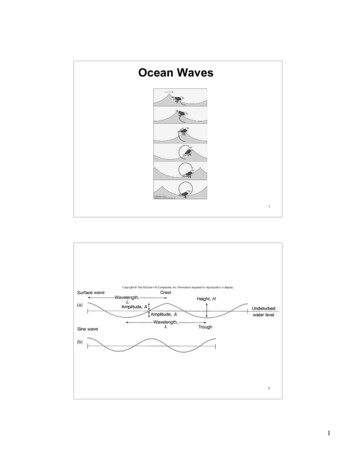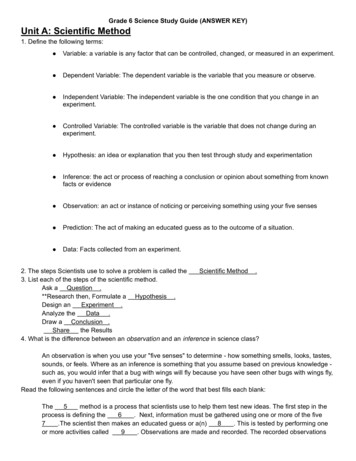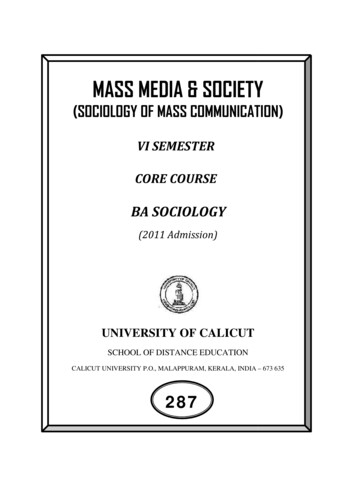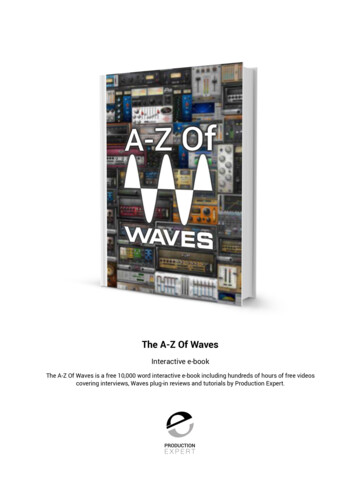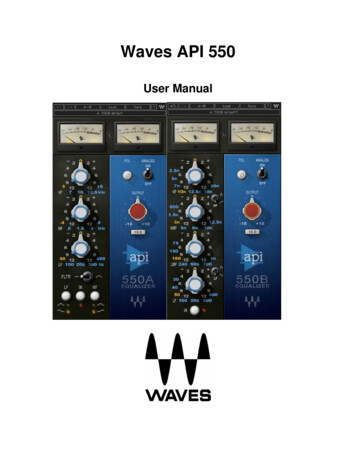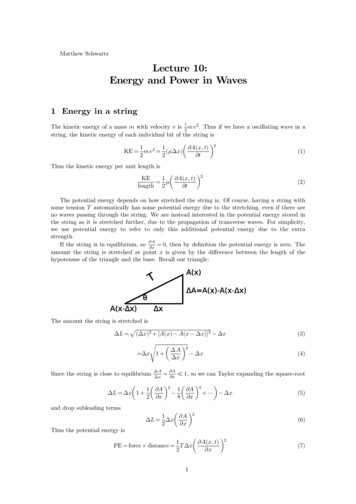
Transcription
WAVES OF CHANGETHE MASSACHUSETTS OCEANMANAGEMENT TASK FORCEREPORT AND RECOMMENDATIONSMarch, 2004
MASSACHUSETTS OCEAN MANAGEMENTTASK FORCE - MEMBERSChairFederal Agency Ex Officio MembersSusan Tierney, former EOEA Secretary; Managing Principal,Elmer Danenberger, Minerals Management Service,The Analysis Group, Inc.U.S. Department of InteriorDavid Hartman, Manager, New Hampshire Coastal ProgramState OfficialsPaul Diodati, Director, Division of Marine FisheriesJim Hunt, Director, MEPADavid O'Connor, Commissioner, Division of Energy ResourcesRobbin Peach, Executive Director, Massachusetts Environmental TrustTom Skinner, Director, Office of Coastal Zone ManagementEldon Hout, Director, Office of Ocean & CoastalResource Management, NOAA (Represented by Betsy Nicholson)Paul Howard, Executive Director, New EnglandFisheries Management CouncilColonel Thomas L. Koning, U.S. Army Corps of Engineers(Represented by Christine Godfrey)Pat Kurkul, Regional Director, NOAA FisheriesLocal OfficialsCraig MacDonald, Superintendent, Stellwagen Bank NMSMayor John Bell, City of Gloucester (Represented by Dale Brown,Captain Brian Selarno, U.S. Coast Guard (Represented byCommunity Development Director, City of Gloucester)Mayor Fred Kalisz, City of New Bedford (Represented byJohn Simpson, Executive Director of the New BedfordHarbor Development Commission)Mayor Thomas Menino, City of Boston (Represented byRichard McGuinness, Boston Redevelopment Authority)Lt. Gabrielle McGrath, Chief of the Planning Department,U.S. Coast Guard Marine Safety Office in Boston)Bob Varney, Regional Administrator, U.S. EPA(Represented by Tim Timmermann)Jeff Willis, Deputy Director, Coastal ResourcesManagement Council, Rhode IslandTim Smith, Town Administrator, Town of WellfleetState Elected Ex Officio MembersPublic MembersHon. Robert O'Leary, Massachusetts Senate, Cape and IslandsBill Adler, Executive Director, Mass. Lobstermen’s Association;Hon. Bruce E. Tarr, Massachusetts Senate, First Essex and MiddlesexMarine Fisheries Advisory BoardPriscilla Brooks, Conservation Law Foundation;Hon. Susan Williams Gifford, House of Representatives, Second PlymouthHon. Anthony J. Verga, House of Representatives, Fifth EssexGulf of Maine Council MemberJack Clarke, Director of Advocacy, Massachusetts Audubon SocietyFederal Elected Ex Officio MembersTom Cox, President, Mass Marine Trades Association;Hon. Edward M. Kennedy, U.S. Senateco-owner, Constitution MarinaC. M. “Rip” Cunningham, Jr., Saltwater Sportsman Magazine;Marine Fisheries Advisory BoardHon. John Kerry, U.S. SenateHon. Michael E. Capuano, U.S. House of RepresentativesHon. William Delahunt, U.S. House of RepresentativesMichael Egan, Founder, Carruth Capital, LLCHon. Barney Frank, U.S. House of RepresentativesMike Leone, Port Director, Massachusetts Port Authority;Hon. Stephen F. Lynch, U.S. House of RepresentativesChair, American Association of Port AuthoritiesHon. Edward J. Markey, U.S. House of RepresentativesVivien Li, Executive Director, The Boston Harbor AssociationHon. James McGovern, U.S. House of RepresentativesJames McCarthy, Professor, Harvard UniversityHon. Marty Meehan, U.S. House of RepresentativesJudy McDowell, Director, Woods Hole Oceanographic InstitutionHon. Richard E. Neal, U.S. House of RepresentativesSea GrantE. Randolph Tucker, Partner, Piper Rudnick LLPGreg Watson, Vice President, Massachusetts Technology CollaborativeLarry Wheatley, AttorneyHon. John Olver, U.S. House of RepresentativesHon. John F. Tierney, U.S. House of Representatives
MASSACHUSETTS OCEAN MANAGEMENT TASK FORCEREPORT AND RECOMMENDATIONSTABLE OF CONTENTSTask Force MembershipInside front coverAcknowledgements2Letter from Chair3Executive Summary5Summary of Recommendations9Introduction17Map of Ocean eRecommendations29Management ToolsRecommendations37Scientific ons59Conclusion65Appendix67Table of Contents for Technical ReportWorking Groups of the OceanManagement Task Force1
ACKNOWLEDGEMENTSThe Task Force’s report is the result of significant effort on the part of many people during a relatively short period of time, given the complexity and importance of the assignment. The Task Force hasbeen able to accomplish its work under a challenging time frame due, in part, to the commitmentand support of Task Force members, agency staff, and volunteers. Several Task Force members inparticular, along with state agency staff and private sector consultants, provided significant assistance in researching and drafting sections of this report and its companion Technical Report. Theseindividuals are: Bill Adler (Massachusetts Lobstermen’s Association), Mike Armstrong (MassachusettsDivision of Marine Fisheries (DMF)), Deerin Babb-Brott (Massachusetts Coastal Zone Management(CZM), Jay Baker (CZM), Priscilla Brooks (Conservation Law Foundation), Todd Callaghan (CZM),Dennis Ducsik (CZM), John Duff (U-Mass/Boston), Mike Egan (Carruth Capital), Bruce Estrella (DMF),Tom Hoopes (DMF), Jim Hunt (Massachusetts Environmental Policy Act (MEPA) office), Sarah Joor(CZM), Kate Killerlain (CZM), Judy McDowell (Woods Hole Oceanographic Institution), Vin Malkoski(DMF), Joe Pelczarski (CZM), Ann Pembroke (Normandeau Associates), Arthur Pugsley (MEPA), TomSkinner (CZM), Susan Snow-Cotter (CZM), Megan Tyrrell (CZM), Sue Tierney (The Analysis Group,Inc.), Greg Watson (Massachusetts Technology Collaborative), Alex White (CZM), and Tony Wilbur (CZM).The Task Force also appreciates the leadership and hard work provided by Task Force WorkingGroup Chairs including: Sue Tierney (Frameworks Working Group), Jim Hunt (Policy WorkingGroup), Tom Skinner (Use Characterization Working Group), Judy McDowell (Data Trends andNeeds Working Group), David O'Connor (Principles Working Group) and Robbin Peach(Outreach Working Group).Behind many task forces is a hard-working and dedicated staff. Ours was particularly well supported by Susan Snow-Cotter (CZM) and Sarah Joor (CZM), who provided lead policy and logistics assistance to the Task Force and its many working groups.The Task Force would also like to acknowledgethe generous financial assistance for the OceanManagement Initiative provided by the MassachusettsEnvironmental Trust and by the National Oceanic andAtmospheric Administration. Without this support,this work would not have been possible.PhotosAll photographs courtesy of NOAA photo library, CZM archives, or CZM staff unless otherwise noted.Cover PhotosBackground waves - Jennifer MacLean; all others NOAADesign/LayoutArden Miller, CZMMap of Ocean JurisdictionDiane Carle, CZM2
MARCH 2004To:Ellen Roy Herzfelder, Secretary of Environmental AffairsFrom:Susan Tierney, Chair, Massachusetts Ocean Management Task ForceRe:Task Force Final Report, Principles and RecommendationsOn behalf of the Massachusetts Ocean Management Task Force, I am pleased to present our Final Report,Principles, and Recommendations for managing the Commonwealth's ocean resources.Ever since you established the Task Force in June 2003, the public officials and private citizens who are TaskForce members have taken seriously the charges that you assigned to us. This Final Report reflects our collective efforts to respond to your request that we: Define guiding principles for the use of state waters and ocean resources;Examine Massachusetts coastal policies and the adequacy of the legal framework;Determine data requirements for managing state waters; andExamine the organization of governance over state waters to ensure that statewideinterests are met.In addressing these issues, the Task Force members have endeavored to understand the rich and diversefeatures of the Commonwealth’s ocean resources, the character of these “public trust” resources whichare held and managed on behalf of Massachusetts citizens, the existing set of governmental statutes,regulations, and processes that affect the protection and use of these ocean resources, and possible waysto enhance the management and, in some cases, uses of these resources for the benefit of the citizens ofthe Commonwealth at present and for the future.We have also been particularly mindful of current uses and natural resource qualities of the state’s oceans,and of our state’s rich cultural, social, and economic heritage that has been tied so closely to the ocean andour varied interactions to it. We took as our point of departure the current state of resources and uses,growing tensions between existing and proposed uses and resource needs, and the current set of laws andregulations affecting them, in order to consider what legal authorities and action might be needed to assurethat the Bay State's public trust ocean resources are adequately protected while also fostering sustainableuses of them. We noted the tensions that are growing with respect to competing uses of the state’s oceanresources and the relationship between oceans under state versus federal versus regional jurisdiction.During the past months of education, research, analysis, public consultation, and discussion, the TaskForce members have developed Principles and Recommendations for managing the Commonwealth’socean resources. We have written this Report and its accompanying Technical Report to attempt todescribe the conditions of our ocean resources and the state of knowledge and policy tools relating toour oceans. These elements have formed the basis for our policy recommendations to you.Our Principles are a statement of the main beliefs and values that we think are appropriate to guidepublic policy decisions about the protection and use of the Commonwealth's ocean resources. OurRecommendations reflect our views about the legal, public policy, and information tools the Commonwealthneeds to have and exercise to assure appropriate protections of these resources and to allow appropriateuses of them for various public and private purposes today and in the future. The Technical Report providesdetailed background information on the state of our oceans, data relating to them, and the policy andmanagement tools the state has to regulate and protect our ocean resources for the benefit of the public.In preparing these principles, recommendations, and reports, we had lively debates and discussions.The Task Force members came with different points of view, and individual members might have writtena different report if they had authored it alone. The Task Force members as a whole, however, have3
attempted to provide you with a consensus document. Like any such consensus document amongresponsible citizens with different perspectives, our report reflects numerous compromises amongstrongly held positions.We have attempted to gather public input during the course of our work and have benefitedsubstantially from comments from members of the public, representatives of interested groups,and various experts from relevant fields. We understand that it will be important to continue to seekadditional public comment, now that our report and recommendations to you have been finalized.Indeed, we understand that in some respects, the presentation of our findings and recommendationsto you is only one step in a much longer process in which you, the Romney Administration, andmembers of the Massachusetts General Court will make decisions about what, if any, changes to make inthe Commonwealth’s statutes, regulations, and other governance processes in response to the Task Force’sRecommendations. Public input will be a critical part of that larger process, and we welcome it - evenwhen the opinions differ from our own.We recognize that we offer these recommendations at a time of significant state budgetaryconstraints, including many years in which state agencies involved with matters relating to thestate’s oceans have been operated with reduced staffs and budgets. We also recognize that adoptionand implementation of many of our recommendations will require additional public resources. Wethink that the health of our oceans is critical to the health of our state in the future, and we urgeyou and other state officials to make ocean management a priority in both substantive policy andresource allocation decisions.Additionally, we know it is timely for the Commonwealth to proceed on these recommendations inlight of recent undertakings by various organizations (including several major initiatives at the nationallevel, including the Pew Oceans Commission and the U.S. Commission on Ocean Policy) to makerecommendations for management of the federal oceans. Massachusetts is at the forefront of stateocean management and protection and we have an opportunity to work closely with these nationalefforts to manage our own state's ocean resources in a proactive manner that both protects theunderlying marine ecosystem and serves public needs for food and energy production, shipping,recreation, waste disposal, telecommunication, etc.We wish you success in continuing stewardship of the Massachusetts oceans, and we extend ourappreciation of the priority that you have made of this resource that is so important to what hasmade Massachusetts such a special place to live - in the past and in the future.4
EXECUTIVE SUMMARYChanging Ocean UsesCoastal and ocean waters have played a significant role in the history of Massachusetts, for fishing,shipbuilding, trade, recreation, and scientific research, among other things. These multiple uses of theocean are well known and appreciated as part of the fabric of what makes our state so specialhistorically. More recently, we have begun to use our ocean for such activities as aquaculture, laying offiber optic cables, a gas pipeline, artificial reefs, high-speed ferries and more. Today, there is interest indiversifying our dependence on fossil fuels by producing energy from wind and wave energy off ourcoast. Other potential emerging uses of the ocean range from the designation of marine protectedareas to ensure the conservation of marine ecosystems to the siting of offshore liquid natural gasfacilities to the extraction of offshore sand for restoring our recreational beaches.These evolving uses of the ocean represent both a considerable opportunity and challenge forthe Commonwealth. To help feed our densely-packed population, we clearly need protein madeavailable from the fishing and aquaculture industries. To fuel our cars, homes and businesses, weneed diverse energy sources, some of which are located in the ocean or are transported throughit. The threat of global climate change requires us to use more renewable resources for ourelectricity supply, and some of the most abundant such resources are located in the ocean. Wevalue the recreation and beauty that the ocean provides. We have also learned the hard way(such as through the collapse of groundfish resources, the pollution of Boston Harbor, shellfishclosures, and oil spills) that marine resources are not limitless, can take decades to restore, andrequire more vigilant protection in the future than in the past. It is clear that ocean space is limited.Conflicts between different uses within our oceans have historically been few, but as more usesare permitted and proposed, greater conflict is inevitable. With the range of both traditional andemerging uses before us, many questions have been raised. Which uses should be allowed inwhich areas? Who should decide? How do we ensure that individual and collective uses do notharm the environment? Do we have the right information to make those decisions? Do publicagencies that are authorized to make these decisions have the right tools? Given that the oceanis a public trust resource, how should the Commonwealth effectively manage the “assets of thetrust” it owns on behalf of the public to best protect and use them for the benefit of citizenstoday and in the future?Ocean Management Initiative and Task ForceIn recognition of the range of existing and proposed ocean uses in the Commonwealth and themany questions being raised on managing our ocean resources and the uses of them, GovernorMitt Romney and Secretary of Environmental Affairs Ellen Roy Herzfelder announced an OceanManagement Initiative in March of 2003. The first phase of this Initiative was the appointmentof an Ocean Management Task Force in June of 2003. Secretary Herzfelder charged the group toexamine the current trends and issues, identify data and information gaps, review existing oceangovernance mechanisms, and draft recommendations for administrative, regulatory, and statutorychanges, if deemed necessary. The Task Force was also asked to develop statewide ocean managementprinciples to guide future ocean management in the Commonwealth.The Task Force is comprised of 23 private and public sector individuals (listed on inside front cover).The Secretary also asked representatives from the relevant federal agencies, adjacent states, andmembers of the state and federal congressional delegation to participate as ex-officio members.The Task Force was chaired by Dr. Susan Tierney, a former Secretary of Environmental Affairs inMassachusetts, former Assistant Secretary for Policy in the U.S. Department of Energy, andcurrently a Managing Principal at Analysis Group Inc.5
Task Force ProcessThe Task Force and its Working Groups met over thirty times between June 2003 and March 2004.All meetings were open to the public and all written material was made available on the Task Forcewebsite (http://www.state.ma.us/czm/oceanmgtinitiative). To enable the Task Force to explore issuesin greater depth, six Working Groups were established: Frameworks; Policy; Use Characterization;Outreach, Principles; and Data Trends and Needs (refer to Appendix for more on the Task Force’sWorking Groups). In addition to the Task Force and Working Group meetings, the Task Force heldsix public meetings, the largest in October at the New England Aquarium. Preliminary recommendations were released for public comment in early December. When the public comment periodended on February 13th, 2004, over three hundred comments had been submitted (and areavailable on the Task Force website).Geographic Focus of ReportThe Ocean Management Task Force focused its work on ocean areas within the Commonwealth’sjurisdiction. Generally, this area extends from the low water mark to the seaward boundary of theCommonwealth. Typically, the Commonwealth’s marine boundary extends three nautical miles offshorewith the exception of areas within Massachusetts Bay, Cape Cod Bay, and Nantucket Sound that extendfurther due to bay closure lines established by the U.S. Supreme Court.Report StructureThe Ocean Management Task Force Report is broken up into two volumes: this Task Force Report andRecommendations, and the companion Technical Report. The Task Force Report and Recommendationscontains an introduction, descriptions of the theme areas (e.g., governance, management tools, scientificunderstanding, and public outreach) that the Task Force has addressed, six Principles for ocean management, fifteen Recommendations with justifications and implementation plans, and a conclusion. TheTechnical Report contains a wealth of information provided by Task Force members and staff to supportthe recommendations provided herein. The Technical Report includes chapters on the public trust doctrine in Massachusetts, a descriptive overview of traditional and emerging ocean uses, an overview ofdata trends and needs, a summary of state and federal regulatory authorities relating to ocean resources,and several appendices.Conclusions and RecommendationsAfter lengthy consideration of the issues relating to ocean use, protection, and management, theTask Force found that the Commonwealth agencies have done a commendable job managing thestate’s ocean resources. That being said, the times are changing and the tools that the agencieshave to do their jobs are not keeping pace with the increasing complexity and challenges of themanagement issues before them.The oceans and its resources are held in trust by the state for the benefit of the public. The Task Forcebelieves that the oceans are too valuable a resource to continue to manage in an ad hoc and reactivemanner. Below are six basic principles of ocean resource management, as well as fifteenrecommendations aimed at improving the comprehensive management of ocean resources.Underlying our principles of ocean resource management is our belief that our oceans embodyextraordinarily dynamic and complex environments that are influenced by a combination of naturalforces and human activities. Healthy ocean ecosystems are vital to human health and welfare. Humanactivities above, below and on the ocean surface, as well as on land, can and should be managed toallow both use and protection of ocean resources. Principles for managing those activities shouldembody an ethic of ocean stewardship that: (1) protects the public trust; (2) values biodiversity; (3)respects the interdependence of ecosystems; (4) fosters sustainable uses; (5) makes use of the bestavailable information; and (6) encourages public participation in decision-making.6
Our fifteen policy recommendations are grouped by the themes of governance, management tools, scientific understanding and outreach.LIST OF overnanceComprehensive Ocean ResourcesManagement Act (CORMA)The Secretary of Environmental Affairs should developlegislation for a new, comprehensive Ocean ResourceManagement Act.29GovernanceOcean Management CoordinationThe Commonwealth should actively promote federal/regional/state cooperative ecosystem management.32GovernanceClimate Change PlansThe Commonwealth's Climate Change Action Plan shouldinclude actions relating to effects of climate change onour coasts and oceans.33GovernanceOcean Sanctuaries Act RevisionsThe regulations implementing the Ocean Sanctuaries Act(OSA) (302 CMR 5.00) should be updated.35Management ToolsFee Structures and LevelsCurrent Chapter 91 license fees in offshore waters should be 39examined and adjusted (i.e., increased or decreased) whereappropriate.Management ToolsMarine Protected Areas (MPAs)The Secretary of Environmental Affairs should convene aworking group to develop recommendations regarding thedesignation of Marine Protected Areas.40Management ToolsCoordination of MitigationInteragency coordination of project mitigation shouldbe improved.43Management ToolsEnforcementEnforcement of existing environmental laws shouldbe a high priority.44Management ToolsVisual, Cultural, and Aesthetic ImpactsMethodologies and standards for the analysis of visual,cultural, and aesthetic impacts of proposed projects in statewaters should be developed.45Management ToolsUse CharacterizationInventories of the uses and resources of the state’s marinewaters should be developed.46ScientificMarine and Ocean ResourceTrends Advisory GroupAn advisory group of marine and fishery scientistsshould be appointed to advise the state.52UnderstandingScientificOcean Monitoring and ResearchA comprehensive ocean resources monitoring and researchplan should be developed.54Seafloor MappingThe Commonwealth should acquire seafloor maps.56Standardized Protocolsfor Data CollectionStandards should be developed for monitoringdata submitted by project proponents.57UnderstandingOutreachOcean Literacy and StewardshipThe Secretary should commit to developing a new oceanliteracy and stewardship ethic among all citizensof Massachusetts.60OutreachDissemination of Ocean Resource DataPublic dissemination of certain data collected on theCommonwealth’s resources should be ientific7
Where do we go from here?The recommendations in this report are prospective in nature and will not impact projects or proposals already under regulatory review. We believe that sound public policy requires that any newlaws, regulations, or policies adopted in line with our recommendations be applied prospectivelywith respect to projects filed after the adoption of these new policies. We neither recommend amoratorium on development and permitting activities, nor want our proposals and uncertaintyabout policy to have the effect of chilling development. While in this report we offer recommendations to change the existing permit process, no changes in process will occur by virtue of this reportalone, since the Task Force alone has no legal authority. Our recommendations are offered to theSecretary of Environmental Affairs, who has stated that she will hold public hearings on the reportprior to submitting her recommendations to the Governor. Any statutory or regulatory changes thatthe Secretary decides to advance based on this report will be subject to public notice requirements,and will undergo policy debate and discussion in the legislative, regulatory, and political forums thattake up these matters for consideration and decision.In the course of itsdeliberations, the TaskForce became verymuch aware of theextraordinary extent towhich state agenciesare stretched in managing coastalresources: from thereview of ocean-basedprojects to assessingfisheries stocks or habitat, from planning activities in ocean sanctuariesto seafloor mapping, and from permitting to enforcement of resourceprotection laws, many environmental agencies have lost significant staffin recent years. These staff reductions lessen the state's ability to adequately manage ocean resources at precisely the time when it is neededmost. The Task Force recognizes the need to assess current staff levelsand program needs and supports investments in personnel, research,and equipment for Massachusetts’ coastal and ocean resource management and planning programs.In reaching these recommendations, the Task Force has already benefited substantially from comments from members of the public, representatives of interested groups, and various experts fromrelevant fields. We understand that it will be important to continue to seek additional public comment, now that our report and recommendations have been finalized. Indeed, in some respects, thepresentation of our findings and recommendations is only one step in a much longer process inwhich the Romney Administration and members of the Massachusetts General Court make decisions about what, if any, changes to make in the Commonwealth's statutes, regulations and othergovernance processes in response to the Task Force's recommendations.In pursuing its work, the Task Force has in many ways been on the leading edge of state oceanmanagement. Few areas of the world have experience in trying to plan ahead for how we want touse and protect our ocean resources. We encourage the Commonwealth to take these bold stepsto help assure that our ocean resources, which have been so important to Massachusetts's rich history and which are held in trust for the benefit of the public, will continue to be part of our state'shealthy, productive economy and environment in the future, as well.8
SUMMARY OF TASK FORCE RECOMMENDATIONS(THIS SUMMARY WAS EXCERPTED FROM THE REPORT)Governance Recommendation #1:Comprehensive Ocean Resources Management ActRecommendationThe Ocean Management Task Force recommends that the Secretary of Environmental Affairs developlegislation for a new, comprehensive Ocean Resource Management Act, whose centerpiece would be thecreation of new Ocean Resource Management Plans that set forth management objectives and strategiesfor various discrete ocean planning areas and activities within the state waters of the Commonwealth.The Act that we envision would retain and strengthen existing environmental protections associated withthe ocean as a public trust resource while streamlining the array of existing statutes governing the useand protection of the Commonwealth's oceans. State laws and regulations that would likely be affectedunder the Act to improve coordination and strengthen resource protection include the Chapter 91 program at the Department of Environmental Protection (DEP), the program to implement the OceanSanctuaries Act at the Department of Conservation and Recreation (DCR), and the state's Coastal ZoneManagement (CZM) program. In addition, under the new legislation that we are recommending, theDivision of Marine Fisheries (DMF) would be involved (along with other agencies) in the development ofcomprehensive ocean management plans and would retain jurisdiction of day-to-day fisheries management activities.If an Ocean Resource Management Act were adopted, it would supercede several of the policy-relatedrecommendations that appear later in this report that are designed to improve the existing mechanismsfor managing the state's ocean resources in the absence of a new law.Governance Recommendation #2:Ocean Management CoordinationRecommendationMassachusetts should pursue ecosystem management of offshore waters through federal, regional,and state coordination and cooperation. The Task Force recommends that the Commonwealth:1. develop cooperative ocean management plans with federal agencies for offshore waters, forexample in portions of the Gulf of Maine or Nantucket Sound;2. review and revise the state's enforceable coastal policies, based on the passage of theproposed Comprehensive Ocean Resources Management Act or other state legislation,existing statutes, and formal approval by the National Oceanic and AtmosphericAdministration (NOAA);3. continue to apply enforceable coastal policies through federal consistency to activitiesin state waters, coastal watersheds, and adjacent federal waters;4. expand cooperative frameworks for project review, such as the U.S. Army Corpsof Engineers’ Joint Processing meetings;5. support regional and international ocean management councils, such as the Gulf ofMaine Council on the Marine Environment; and9
6. develop and/or expand existing cooperative agreements with adjacent states.Governance Recommendation #3:Climate Change PlansRecommendationGiven t
WAVES OF CHANGE THE MASSACHUSETTS OCEAN MANAGEMENT TASK FORCE REPORT AND RECOMMENDATIONS March, 2004 . Mayor John Bell, City of Gloucester (Represented by Dale Brown, Community Development Director, City of Gloucester) Mayor Fred Kalisz, City of New Bedford (Represented
